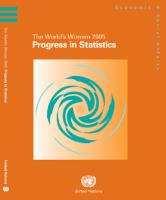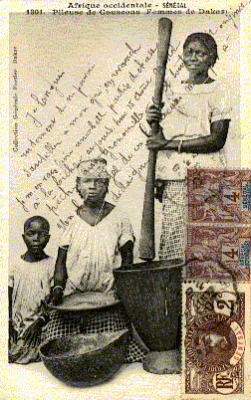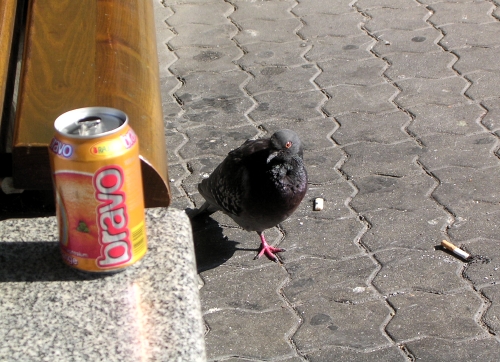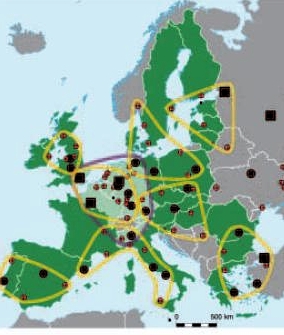[go world]
 darwin´s nighmare, the film by hubert sauper, could be justified by scene 5 only. elsa talks to the off (a male voice). she will be dead soon. Its a documentary.
darwin´s nighmare, the film by hubert sauper, could be justified by scene 5 only. elsa talks to the off (a male voice). she will be dead soon. Its a documentary. I don´t know, but I will continue about my life.
(subitle: Elsa sells her nights fo fishpilots and businessmen. For 10 Dollars)
enough.
Cravij, Cravij, Cravij, yes.
(off: which airline is he from?)
he is a pilot captain, he is from the Ukraine, Russia.
My father is sicking, my father is sicking, my mother is accident,
yes, accident in the bus from dar-es_salaam to shinianga. dodooma - the bus is from Dar-es-Salaam, axccident in Dodooma. So my mother is dead.
but I am sorry, I speak English but is not very well
little bit. I don´t speak very well. I try.
(off: would you like to go to school, again?)
yes, I like because I need more educations.
(off: what would you like to do?)
I like a school about the computer.
scientists have warned in a report released today (30 january) that the effects of climate change could be far worse than already predicted, and that developing countries face the biggest threats.
die lage spitzt sich unüberhörbar zu. the western economic model is not going to work for china. nor will it work for india, which by 2031 is projected to have a population even larger than china’s, or for the other 3 billion people in developing countries who are also dreaming the “american dream.” and in an increasingly integrated world economy, where all countries are competing for the same oil, grain, and mineral resources, the existing economic model will not work for industrial countries either. the days of the fossil-fuel-based, automobile-centered, throwaway economy are numbered. writes lester brown in his new book and one can ![]() download it for free.
download it for free.

sauseschritt war wirklich beeindruckt von der klarheit, bescheidenheit und strenge, mit dem der alte herr mit guten manieren seine thesen vorgetragen hat. im saal der nationen in BIG O trägt er vor und die anschliessende diskussion ist (nicht überraschend) gesittet und auch ein wenig opportunistisch. die einen loben die bemühungen chinas, die anderen loben sich selbst und die dritten sagen, dass der alte mann sage, was BIG O ohnehin immer gepredigt habe. das durchschnittliche alter der hörerschaft liegt bei 50 und lässt rückschlüsse auf den jugendlichen elan der veranstaltung zu. doch dann, und das lässt wirklich aufhorchen, fällt der vergleich mit amerikanischen kriegsanstrengungen nach dem angriff japans auf pearl harbour. sagt der alte herr und spricht von der fühlbaren ankündigung von tiefgreifender veränderung. mindestens (kriegs-) ähnliche anstrengungen seien notwendig, um den globalen kollaps heute (!!!!!) und nicht morgen aufzuhalten. warten wir, die zuhörer/innen und diskutant/inn/en darauf? oder sitzen wir ganz gut hier in unseren stühlen, mit unseren satten gehältern und sicheren aber traurigen privatleben? sauseschritt weiss es eigentlich wirklich nicht. doch hätte er, auch in seinem alter, noch gerne bei einer richtigen revolution mitgemacht. aber er ist wenigstens [hingegangen ....]
 geschlechterspezifische daten fehlen in einem großen teil der weltweiten bevölkerungserhebungen. so werden viele ökonomische, gesundheits- und ausbildungsentscheidungen getroffen, ohne zu wissen, wie viele mädchen und jungen geboren werden, wie viele von ihnen arbeiten oder sterben, so ein un-bericht, der vergangene Woche veröffentlicht wurde. berichtet heute
geschlechterspezifische daten fehlen in einem großen teil der weltweiten bevölkerungserhebungen. so werden viele ökonomische, gesundheits- und ausbildungsentscheidungen getroffen, ohne zu wissen, wie viele mädchen und jungen geboren werden, wie viele von ihnen arbeiten oder sterben, so ein un-bericht, der vergangene Woche veröffentlicht wurde. berichtet heute
this report uniquely focuses on this issue of national reporting of sex disaggregated statistics in such areas as demographics, health, education, work, violence against women, poverty, human rights and decision-making. this is the fourth world’s women report since 1991. the previous three focused on statistical trends in the situation of women. five years ago, the world’s women report emphasized that there was a lack of sex disaggregated data and that the improvement of national statistical capacity – the ability to provide timely and reliable statistics – are essential for improving gender statistics./>

![]() "whiteness studies" is not an attack on people, whatever their skin color. instead, "whiteness studies" is an attempt to think critically about how white skin preference has operated systematically, structurally, and sometimes unconsciously as a dominant force in american—and indeed in global—society and culture. thus it includes examining how white skin preference insinuates itself into the culture of communities of color as well, where we may find everything from prejudice against darker skinned people within the community to commercial practices of white-body imitation and surgery (nose jobs, skin creams, eye-lid alteration, etc.). the transnational character of white privilege results from the legacy of european colonial imperialism, so that whiteness studies may be usefully articulated with theories of globalization and postcoloniality as well.
"whiteness studies" is not an attack on people, whatever their skin color. instead, "whiteness studies" is an attempt to think critically about how white skin preference has operated systematically, structurally, and sometimes unconsciously as a dominant force in american—and indeed in global—society and culture. thus it includes examining how white skin preference insinuates itself into the culture of communities of color as well, where we may find everything from prejudice against darker skinned people within the community to commercial practices of white-body imitation and surgery (nose jobs, skin creams, eye-lid alteration, etc.). the transnational character of white privilege results from the legacy of european colonial imperialism, so that whiteness studies may be usefully articulated with theories of globalization and postcoloniality as well.
in diesem zusammenhang hat auch das
katrina's aftermath is indeed a nightmare of social chaos that would have been hard to imagine in simulations or scenarios before the fact. as bad as we knew the worst case could be, i don't think we could have predicted human response. who would've thought that snipers would target hospital evacuations, and armed gangs would try to take control of the city?
writes ![]() worldchanging in response to an article by
worldchanging in response to an article by ![]() david brooks in nytimes in which the "human storm" following the rainstorm katrina is discussed. facing the social apokalypse in new orleans an increasing number of bloggers discuss the social (human!!) costs of catastrophy, e.g.
david brooks in nytimes in which the "human storm" following the rainstorm katrina is discussed. facing the social apokalypse in new orleans an increasing number of bloggers discuss the social (human!!) costs of catastrophy, e.g. ![]() slate does.
slate does.
 manche mögen sich ja in bösesten zynismus retten, wie etwa bloggnjus in seiner glosse über
manche mögen sich ja in bösesten zynismus retten, wie etwa bloggnjus in seiner glosse über in 2001, fema warned that a hurricane striking new 0rleans was one of the three most likely disasters in the u.s. but the bush administration cut new orleans flood control funding by 44 percent to pay for the iraq war, ![]() reports der spiegel (english version).
reports der spiegel (english version).
 großmutter hat damals, als sauseschritt noch unverdorben, fast unschuldig und ein wenig sehr naiv war, immer vom kommenden weltuntergang erzählt. dieser bestand meist aus donner, dunklen wolken und viel, viel krach. die daraus entstehende kindliche vorstellung vom ende aller welten hatte erst dann seine bedrohliche dimension verloren, als im schulunterricht nestroy gelesen wurde, jenes couplé in
großmutter hat damals, als sauseschritt noch unverdorben, fast unschuldig und ein wenig sehr naiv war, immer vom kommenden weltuntergang erzählt. dieser bestand meist aus donner, dunklen wolken und viel, viel krach. die daraus entstehende kindliche vorstellung vom ende aller welten hatte erst dann seine bedrohliche dimension verloren, als im schulunterricht nestroy gelesen wurde, jenes couplé in  but when it comes to economics, transportation and planning, thinking purely in terms of urban centers and peripheries is often too limiting. even state or nation level has limits, as financial and vehicular flows very often cross the quaint borders assigned decades or centuries ago. as a result, a growing number of urban analysts are starting to look at a new level: the megalopolis, starts a post on transmegapolitan trends on
but when it comes to economics, transportation and planning, thinking purely in terms of urban centers and peripheries is often too limiting. even state or nation level has limits, as financial and vehicular flows very often cross the quaint borders assigned decades or centuries ago. as a result, a growing number of urban analysts are starting to look at a new level: the megalopolis, starts a post on transmegapolitan trends on ![]() worldchanging.
worldchanging.

was antwortet man/frau auf solch flotte alles oder nichts rhetorica, die wohl nur dazu dienen, um scheinbar eloquent eine glosse zu ihrem nachdenklichen ende zu bringen? was antwortet man/frau auf den zynischen pragmatismus eines musikjournalisten, der den vorwurf an live8, auf afrikanische musiker vergessen zu haben, mit dem hinweis abschmettert, dass afrikanische popmusiker ohnehin nicht quotengerecht genug seien. letzlich: was denkt man/frau über die von einem journalisten vorgetragenen begeisterung darüber, dass ein massenpublikum auf einer affektiven ebene gepackt werden müsse (sic!)?
noch so ein [charity geschädigter ....], denkt sauseschritt, dem die kritik an live8 die lust an der so vergnüglichen kollektiven emphase zu rauben droht. lohnt es, auf solche mit der inbrunst der besserwisserei geäußerten vorurteile zu antworten? oder sollte herrn glaser doch besser ein kurs in kritischer medientheorie und entwicklungspolitik empfohlen werden?
und so schließt sauseschritt mit der paraphrase: die alternative zu gerhard stögers kommentar wäre, gar nichts zu schreiben. und das wäre gar keine so schlechte idee.


